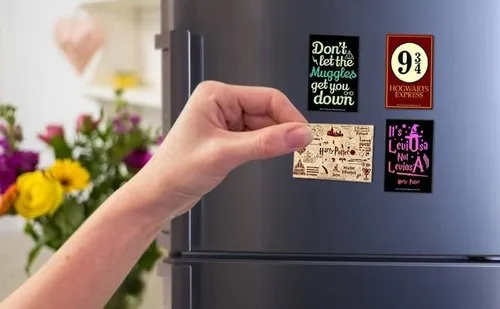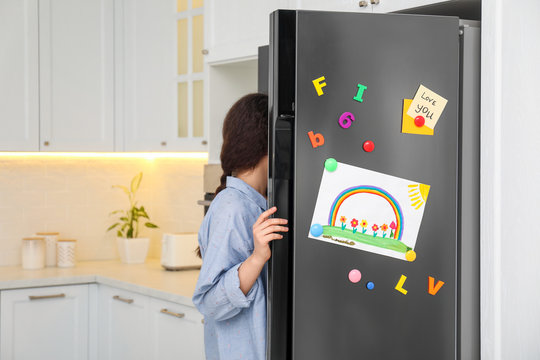Fridge magnets, those small but charming accessories adorning our refrigerators, have become symbolic expressions of personality and memories. Yet, behind their decorative facade, traditional fridge magnets often carry an environmental burden. From manufacturing processes to end-of-life disposal, these seemingly innocuous items contribute to pollution and resource depletion. In this exploration, we will delve into the environmental impact of conventional fridge magnets and unveil a world of eco-friendly alternatives that promise to minimize our ecological footprint.
The Environmental Toll of Traditional Fridge Magnets:

1. Materials and Production:
Traditional fridge magnets typically consist of materials like polyvinyl chloride (PVC) and other non-biodegradable plastics. The extraction and manufacturing processes of these materials contribute significantly to environmental degradation, including habitat destruction and pollution.
2. Energy Intensity:
The production of traditional magnets involves energy-intensive processes, contributing to greenhouse gas emissions. From the extraction of raw materials to the final manufacturing stages, the carbon footprint associated with traditional fridge magnets is substantial.
3. Limited Recycling Options:
When the lifecycle of a fridge magnet concludes, disposal options are often limited. Many magnets end up in landfills, where they persist for extended periods, releasing potentially harmful substances into the soil.
Eco-Friendly Alternatives:

1. Biodegradable Materials:
Transitioning to biodegradable materials is a significant step towards reducing the environmental impact of fridge magnets. Materials such as plant-based plastics or recycled paper can be used to create magnets that decompose naturally, leaving behind minimal ecological residue.
2. Sustainable Wood Magnets:
Wooden fridge magnets sourced from responsibly managed forests provide a sustainable alternative. The production of these magnets involves fewer emissions compared to traditional manufacturing processes, and they add a natural aesthetic to your refrigerator.
3. Cork Magnets:
Cork, a renewable and easily recyclable material, is gaining popularity as an eco-friendly alternative for fridge magnets. The extraction of cork doesn’t harm the trees, making it a sustainable choice that adds a unique texture to magnet design.
4. Upcycled Magnets:
Transforming discarded materials into magnets is an innovative way to reduce demand for new resources. Upcycled magnets, crafted from repurposed materials, not only minimize waste but also offer a creative and unique touch.
5. Magnetic Paper:
Combining functionality with recyclability, magnetic paper offers an environmentally friendly alternative. Made from recycled materials, these magnets can be disposed of through paper recycling programs, reducing the environmental impact further.
6. Magnetic Stone:
Natural stones, when magnetized, serve as durable and aesthetically pleasing alternatives. These stones are not only eco-friendly but also contribute to a unique and distinctive magnet design.
7. Eco-Friendly Inks:
In addition to the material of the magnet itself, consideration should be given to the inks used in printing. Opting for eco-friendly, non-toxic inks further reduces the overall environmental impact of fridge magnets.
Encouraging Sustainable Practices:

- Consumer Awareness: Educating consumers about the environmental impact of traditional fridge magnets and the availability of eco-friendly alternatives is crucial. Informed choices empower individuals to make sustainable purchasing decisions.
- Recycling Programs: Implementing and promoting recycling programs for old or unused magnets can divert them from landfills. Collaborating with recycling facilities ensures that the materials are processed in an environmentally responsible manner.
- Industry Collaboration: Encouraging manufacturers to adopt sustainable practices and materials is essential. Industry-wide initiatives can drive positive change by promoting eco-friendly alternatives and responsible production methods.
The Ripple Effect of Eco-Friendly Fridge Magnets:

1. Consumer Choices:
Choosing eco-friendly fridge magnets aligns with a broader movement toward sustainable consumerism. As individuals become more conscious of their environmental footprint, these choices contribute to a collective effort to reduce the overall impact on the planet.
2. Aesthetics and Individual Expression:
Contrary to the misconception that eco-friendly options compromise on aesthetics, these alternatives often offer unique and distinctive designs. Sustainable materials like cork, wood, and stone can add an organic and personalized touch to refrigerator decor, allowing individuals to express their style in an environmentally responsible manner.
3. Supporting Innovation:
The adoption of eco-friendly materials for fridge magnets supports innovation in sustainable manufacturing. As demand grows for such alternatives, manufacturers are incentivized to invest in research and development, driving the industry towards greener and more sustainable practices.
4. Educational Opportunities:
Eco-friendly fridge magnets present an opportunity for educational initiatives. By showcasing the benefits of sustainable materials and manufacturing processes, consumers become more informed about the choices they make and their impact on the environment.
5. Encouraging Local and Artisanal Production:
Sustainable fridge magnets often involve locally sourced or artisanal materials, supporting local economies and reducing the carbon footprint associated with global supply chains. This shift encourages a return to craftsmanship and the appreciation of unique, handcrafted items.
6. Eco-Friendly Living Beyond Fridge Magnets:
Embracing sustainable alternatives to fridge magnets can inspire individuals to extend their eco-friendly choices to other aspects of their lives. The mindset shift towards sustainability can permeate various consumer decisions, from household goods to clothing and beyond.
Conclusion:
the environmental impact of fridge magnets goes beyond the materials they are made from; it extends to the choices consumers make and the collective consciousness of society. By opting for eco-friendly alternatives, individuals not only contribute to a healthier planet but also participate in a larger movement towards sustainable living. These seemingly small choices, like selecting an eco-friendly fridge magnet, can indeed have a significant and positive impact on our world. Let’s continue to explore and embrace sustainable magnetism for a brighter and more environmentally friendly future.


